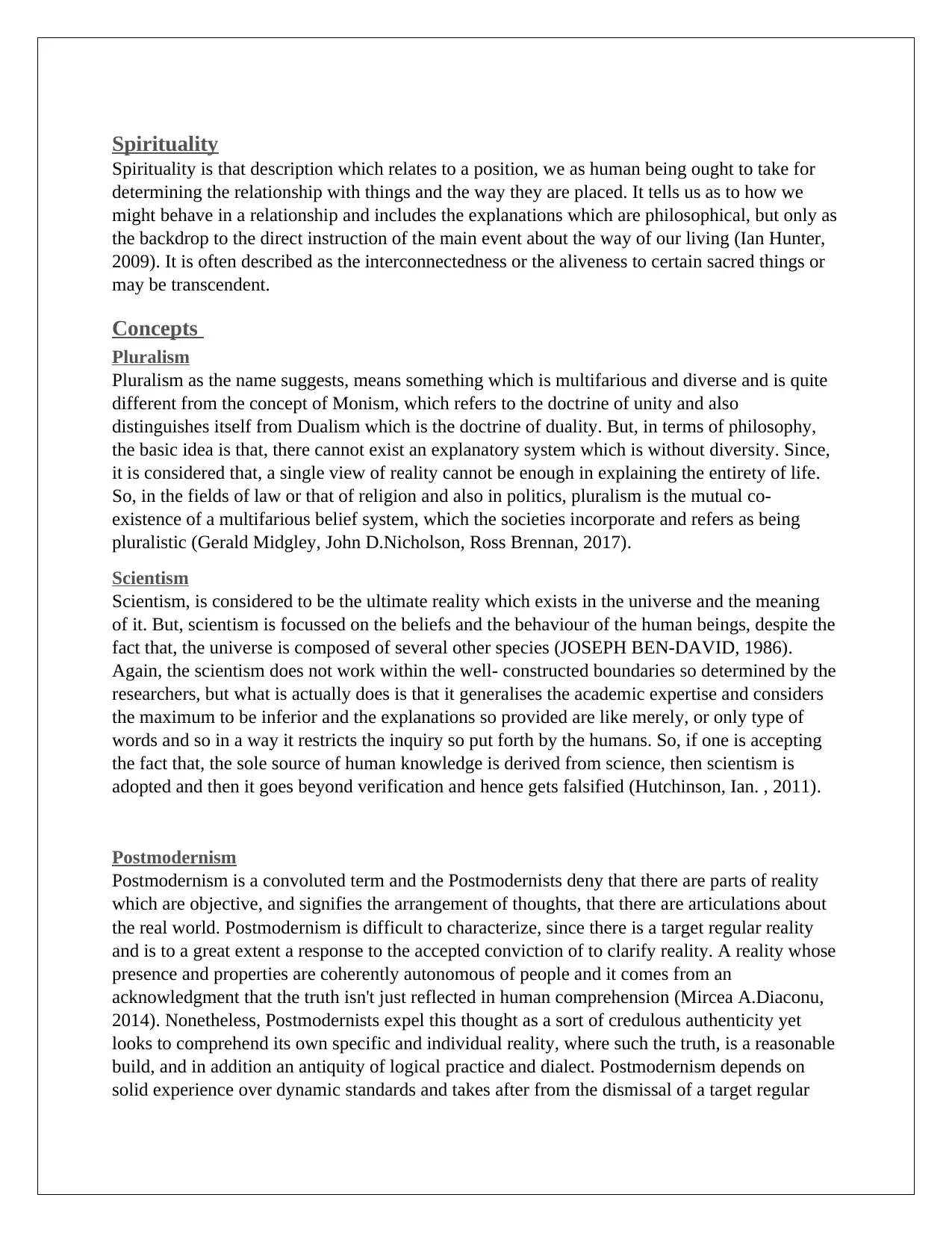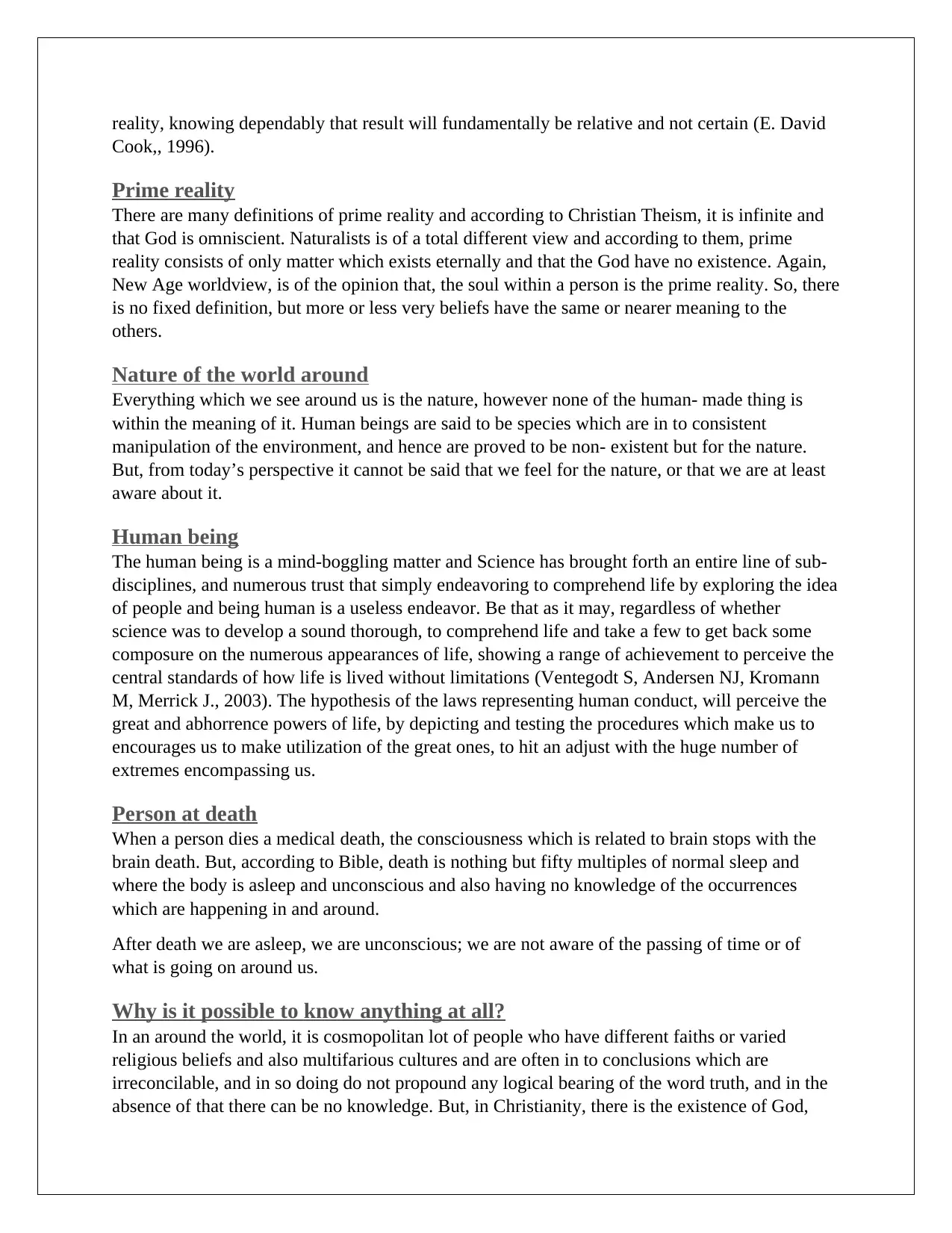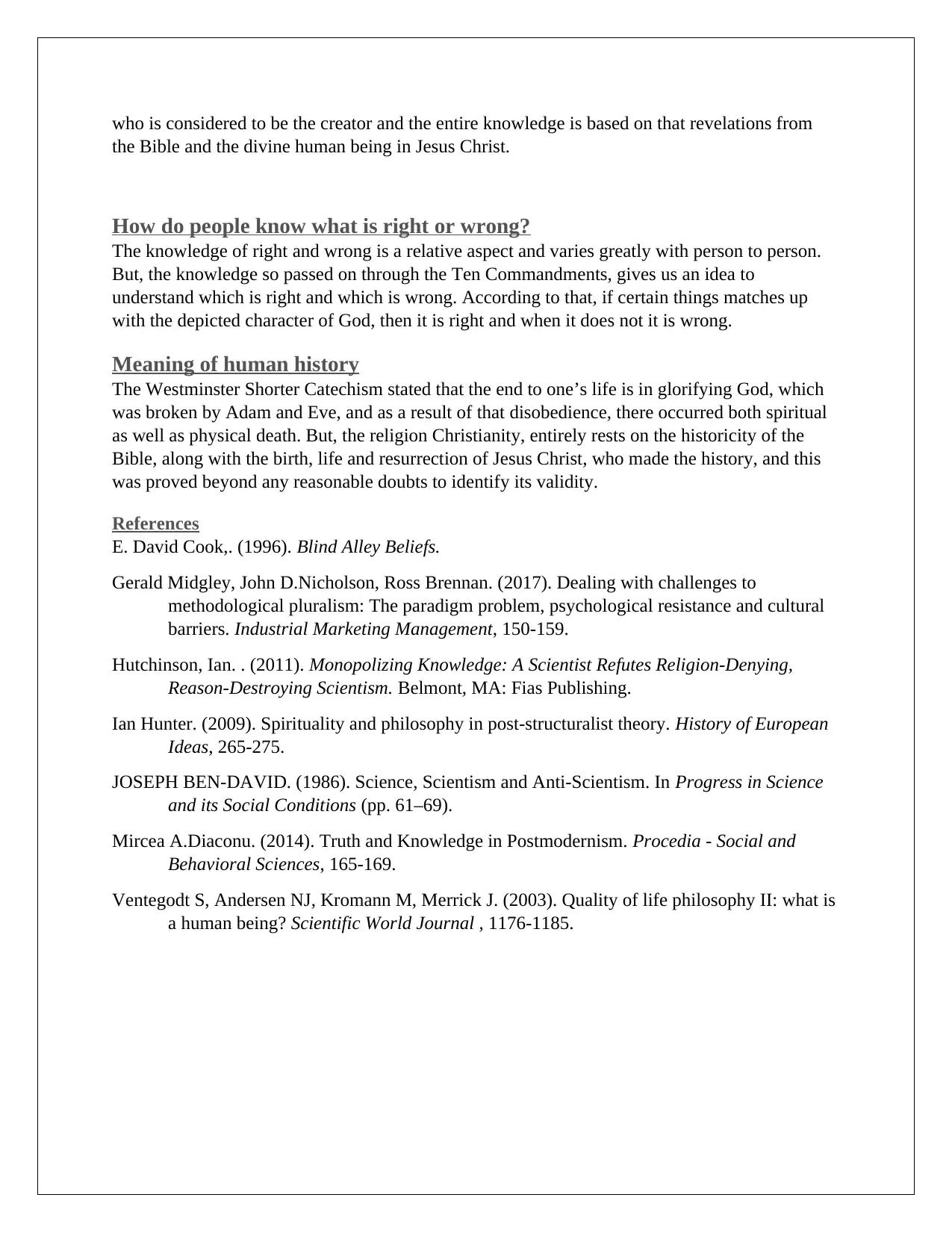Exploring Spirituality, Pluralism, Scientism, Postmodernism: An Essay
VerifiedAdded on 2019/10/01
|3
|1500
|209
Essay
AI Summary
This essay delves into a range of philosophical concepts, beginning with spirituality and its relation to our understanding of the world and our interactions. It then explores pluralism, contrasting it with monism and dualism, highlighting the diversity of belief systems. The essay further examines scientism, critiquing its focus on scientific explanations as the sole source of knowledge. Postmodernism is also analyzed, emphasizing its rejection of objective reality and its focus on individual interpretations. The essay then discusses prime reality from different worldviews, and the nature of the world. It also explores the nature of human beings, the implications of death, how people determine right and wrong, and the meaning of human history. The essay draws upon various sources to support its arguments and provide a comprehensive overview of these interconnected philosophical ideas.

Spirituality
Spirituality is that description which relates to a position, we as human being ought to take for
determining the relationship with things and the way they are placed. It tells us as to how we
might behave in a relationship and includes the explanations which are philosophical, but only as
the backdrop to the direct instruction of the main event about the way of our living (Ian Hunter,
2009). It is often described as the interconnectedness or the aliveness to certain sacred things or
may be transcendent.
Concepts
Pluralism
Pluralism as the name suggests, means something which is multifarious and diverse and is quite
different from the concept of Monism, which refers to the doctrine of unity and also
distinguishes itself from Dualism which is the doctrine of duality. But, in terms of philosophy,
the basic idea is that, there cannot exist an explanatory system which is without diversity. Since,
it is considered that, a single view of reality cannot be enough in explaining the entirety of life.
So, in the fields of law or that of religion and also in politics, pluralism is the mutual co-
existence of a multifarious belief system, which the societies incorporate and refers as being
pluralistic (Gerald Midgley, John D.Nicholson, Ross Brennan, 2017).
Scientism
Scientism, is considered to be the ultimate reality which exists in the universe and the meaning
of it. But, scientism is focussed on the beliefs and the behaviour of the human beings, despite the
fact that, the universe is composed of several other species (JOSEPH BEN-DAVID, 1986).
Again, the scientism does not work within the well- constructed boundaries so determined by the
researchers, but what is actually does is that it generalises the academic expertise and considers
the maximum to be inferior and the explanations so provided are like merely, or only type of
words and so in a way it restricts the inquiry so put forth by the humans. So, if one is accepting
the fact that, the sole source of human knowledge is derived from science, then scientism is
adopted and then it goes beyond verification and hence gets falsified (Hutchinson, Ian. , 2011).
Postmodernism
Postmodernism is a convoluted term and the Postmodernists deny that there are parts of reality
which are objective, and signifies the arrangement of thoughts, that there are articulations about
the real world. Postmodernism is difficult to characterize, since there is a target regular reality
and is to a great extent a response to the accepted conviction of to clarify reality. A reality whose
presence and properties are coherently autonomous of people and it comes from an
acknowledgment that the truth isn't just reflected in human comprehension (Mircea A.Diaconu,
2014). Nonetheless, Postmodernists expel this thought as a sort of credulous authenticity yet
looks to comprehend its own specific and individual reality, where such the truth, is a reasonable
build, and in addition an antiquity of logical practice and dialect. Postmodernism depends on
solid experience over dynamic standards and takes after from the dismissal of a target regular
Spirituality is that description which relates to a position, we as human being ought to take for
determining the relationship with things and the way they are placed. It tells us as to how we
might behave in a relationship and includes the explanations which are philosophical, but only as
the backdrop to the direct instruction of the main event about the way of our living (Ian Hunter,
2009). It is often described as the interconnectedness or the aliveness to certain sacred things or
may be transcendent.
Concepts
Pluralism
Pluralism as the name suggests, means something which is multifarious and diverse and is quite
different from the concept of Monism, which refers to the doctrine of unity and also
distinguishes itself from Dualism which is the doctrine of duality. But, in terms of philosophy,
the basic idea is that, there cannot exist an explanatory system which is without diversity. Since,
it is considered that, a single view of reality cannot be enough in explaining the entirety of life.
So, in the fields of law or that of religion and also in politics, pluralism is the mutual co-
existence of a multifarious belief system, which the societies incorporate and refers as being
pluralistic (Gerald Midgley, John D.Nicholson, Ross Brennan, 2017).
Scientism
Scientism, is considered to be the ultimate reality which exists in the universe and the meaning
of it. But, scientism is focussed on the beliefs and the behaviour of the human beings, despite the
fact that, the universe is composed of several other species (JOSEPH BEN-DAVID, 1986).
Again, the scientism does not work within the well- constructed boundaries so determined by the
researchers, but what is actually does is that it generalises the academic expertise and considers
the maximum to be inferior and the explanations so provided are like merely, or only type of
words and so in a way it restricts the inquiry so put forth by the humans. So, if one is accepting
the fact that, the sole source of human knowledge is derived from science, then scientism is
adopted and then it goes beyond verification and hence gets falsified (Hutchinson, Ian. , 2011).
Postmodernism
Postmodernism is a convoluted term and the Postmodernists deny that there are parts of reality
which are objective, and signifies the arrangement of thoughts, that there are articulations about
the real world. Postmodernism is difficult to characterize, since there is a target regular reality
and is to a great extent a response to the accepted conviction of to clarify reality. A reality whose
presence and properties are coherently autonomous of people and it comes from an
acknowledgment that the truth isn't just reflected in human comprehension (Mircea A.Diaconu,
2014). Nonetheless, Postmodernists expel this thought as a sort of credulous authenticity yet
looks to comprehend its own specific and individual reality, where such the truth, is a reasonable
build, and in addition an antiquity of logical practice and dialect. Postmodernism depends on
solid experience over dynamic standards and takes after from the dismissal of a target regular
Paraphrase This Document
Need a fresh take? Get an instant paraphrase of this document with our AI Paraphraser

reality, knowing dependably that result will fundamentally be relative and not certain (E. David
Cook,, 1996).
Prime reality
There are many definitions of prime reality and according to Christian Theism, it is infinite and
that God is omniscient. Naturalists is of a total different view and according to them, prime
reality consists of only matter which exists eternally and that the God have no existence. Again,
New Age worldview, is of the opinion that, the soul within a person is the prime reality. So, there
is no fixed definition, but more or less very beliefs have the same or nearer meaning to the
others.
Nature of the world around
Everything which we see around us is the nature, however none of the human- made thing is
within the meaning of it. Human beings are said to be species which are in to consistent
manipulation of the environment, and hence are proved to be non- existent but for the nature.
But, from today’s perspective it cannot be said that we feel for the nature, or that we are at least
aware about it.
Human being
The human being is a mind-boggling matter and Science has brought forth an entire line of sub-
disciplines, and numerous trust that simply endeavoring to comprehend life by exploring the idea
of people and being human is a useless endeavor. Be that as it may, regardless of whether
science was to develop a sound thorough, to comprehend life and take a few to get back some
composure on the numerous appearances of life, showing a range of achievement to perceive the
central standards of how life is lived without limitations (Ventegodt S, Andersen NJ, Kromann
M, Merrick J., 2003). The hypothesis of the laws representing human conduct, will perceive the
great and abhorrence powers of life, by depicting and testing the procedures which make us to
encourages us to make utilization of the great ones, to hit an adjust with the huge number of
extremes encompassing us.
Person at death
When a person dies a medical death, the consciousness which is related to brain stops with the
brain death. But, according to Bible, death is nothing but fifty multiples of normal sleep and
where the body is asleep and unconscious and also having no knowledge of the occurrences
which are happening in and around.
After death we are asleep, we are unconscious; we are not aware of the passing of time or of
what is going on around us.
Why is it possible to know anything at all?
In an around the world, it is cosmopolitan lot of people who have different faiths or varied
religious beliefs and also multifarious cultures and are often in to conclusions which are
irreconcilable, and in so doing do not propound any logical bearing of the word truth, and in the
absence of that there can be no knowledge. But, in Christianity, there is the existence of God,
Cook,, 1996).
Prime reality
There are many definitions of prime reality and according to Christian Theism, it is infinite and
that God is omniscient. Naturalists is of a total different view and according to them, prime
reality consists of only matter which exists eternally and that the God have no existence. Again,
New Age worldview, is of the opinion that, the soul within a person is the prime reality. So, there
is no fixed definition, but more or less very beliefs have the same or nearer meaning to the
others.
Nature of the world around
Everything which we see around us is the nature, however none of the human- made thing is
within the meaning of it. Human beings are said to be species which are in to consistent
manipulation of the environment, and hence are proved to be non- existent but for the nature.
But, from today’s perspective it cannot be said that we feel for the nature, or that we are at least
aware about it.
Human being
The human being is a mind-boggling matter and Science has brought forth an entire line of sub-
disciplines, and numerous trust that simply endeavoring to comprehend life by exploring the idea
of people and being human is a useless endeavor. Be that as it may, regardless of whether
science was to develop a sound thorough, to comprehend life and take a few to get back some
composure on the numerous appearances of life, showing a range of achievement to perceive the
central standards of how life is lived without limitations (Ventegodt S, Andersen NJ, Kromann
M, Merrick J., 2003). The hypothesis of the laws representing human conduct, will perceive the
great and abhorrence powers of life, by depicting and testing the procedures which make us to
encourages us to make utilization of the great ones, to hit an adjust with the huge number of
extremes encompassing us.
Person at death
When a person dies a medical death, the consciousness which is related to brain stops with the
brain death. But, according to Bible, death is nothing but fifty multiples of normal sleep and
where the body is asleep and unconscious and also having no knowledge of the occurrences
which are happening in and around.
After death we are asleep, we are unconscious; we are not aware of the passing of time or of
what is going on around us.
Why is it possible to know anything at all?
In an around the world, it is cosmopolitan lot of people who have different faiths or varied
religious beliefs and also multifarious cultures and are often in to conclusions which are
irreconcilable, and in so doing do not propound any logical bearing of the word truth, and in the
absence of that there can be no knowledge. But, in Christianity, there is the existence of God,

who is considered to be the creator and the entire knowledge is based on that revelations from
the Bible and the divine human being in Jesus Christ.
How do people know what is right or wrong?
The knowledge of right and wrong is a relative aspect and varies greatly with person to person.
But, the knowledge so passed on through the Ten Commandments, gives us an idea to
understand which is right and which is wrong. According to that, if certain things matches up
with the depicted character of God, then it is right and when it does not it is wrong.
Meaning of human history
The Westminster Shorter Catechism stated that the end to one’s life is in glorifying God, which
was broken by Adam and Eve, and as a result of that disobedience, there occurred both spiritual
as well as physical death. But, the religion Christianity, entirely rests on the historicity of the
Bible, along with the birth, life and resurrection of Jesus Christ, who made the history, and this
was proved beyond any reasonable doubts to identify its validity.
References
E. David Cook,. (1996). Blind Alley Beliefs.
Gerald Midgley, John D.Nicholson, Ross Brennan. (2017). Dealing with challenges to
methodological pluralism: The paradigm problem, psychological resistance and cultural
barriers. Industrial Marketing Management, 150-159.
Hutchinson, Ian. . (2011). Monopolizing Knowledge: A Scientist Refutes Religion-Denying,
Reason-Destroying Scientism. Belmont, MA: Fias Publishing.
Ian Hunter. (2009). Spirituality and philosophy in post-structuralist theory. History of European
Ideas, 265-275.
JOSEPH BEN-DAVID. (1986). Science, Scientism and Anti-Scientism. In Progress in Science
and its Social Conditions (pp. 61–69).
Mircea A.Diaconu. (2014). Truth and Knowledge in Postmodernism. Procedia - Social and
Behavioral Sciences, 165-169.
Ventegodt S, Andersen NJ, Kromann M, Merrick J. (2003). Quality of life philosophy II: what is
a human being? Scientific World Journal , 1176-1185.
the Bible and the divine human being in Jesus Christ.
How do people know what is right or wrong?
The knowledge of right and wrong is a relative aspect and varies greatly with person to person.
But, the knowledge so passed on through the Ten Commandments, gives us an idea to
understand which is right and which is wrong. According to that, if certain things matches up
with the depicted character of God, then it is right and when it does not it is wrong.
Meaning of human history
The Westminster Shorter Catechism stated that the end to one’s life is in glorifying God, which
was broken by Adam and Eve, and as a result of that disobedience, there occurred both spiritual
as well as physical death. But, the religion Christianity, entirely rests on the historicity of the
Bible, along with the birth, life and resurrection of Jesus Christ, who made the history, and this
was proved beyond any reasonable doubts to identify its validity.
References
E. David Cook,. (1996). Blind Alley Beliefs.
Gerald Midgley, John D.Nicholson, Ross Brennan. (2017). Dealing with challenges to
methodological pluralism: The paradigm problem, psychological resistance and cultural
barriers. Industrial Marketing Management, 150-159.
Hutchinson, Ian. . (2011). Monopolizing Knowledge: A Scientist Refutes Religion-Denying,
Reason-Destroying Scientism. Belmont, MA: Fias Publishing.
Ian Hunter. (2009). Spirituality and philosophy in post-structuralist theory. History of European
Ideas, 265-275.
JOSEPH BEN-DAVID. (1986). Science, Scientism and Anti-Scientism. In Progress in Science
and its Social Conditions (pp. 61–69).
Mircea A.Diaconu. (2014). Truth and Knowledge in Postmodernism. Procedia - Social and
Behavioral Sciences, 165-169.
Ventegodt S, Andersen NJ, Kromann M, Merrick J. (2003). Quality of life philosophy II: what is
a human being? Scientific World Journal , 1176-1185.
⊘ This is a preview!⊘
Do you want full access?
Subscribe today to unlock all pages.

Trusted by 1+ million students worldwide
1 out of 3
Related Documents
Your All-in-One AI-Powered Toolkit for Academic Success.
+13062052269
info@desklib.com
Available 24*7 on WhatsApp / Email
![[object Object]](/_next/static/media/star-bottom.7253800d.svg)
Unlock your academic potential
Copyright © 2020–2025 A2Z Services. All Rights Reserved. Developed and managed by ZUCOL.




